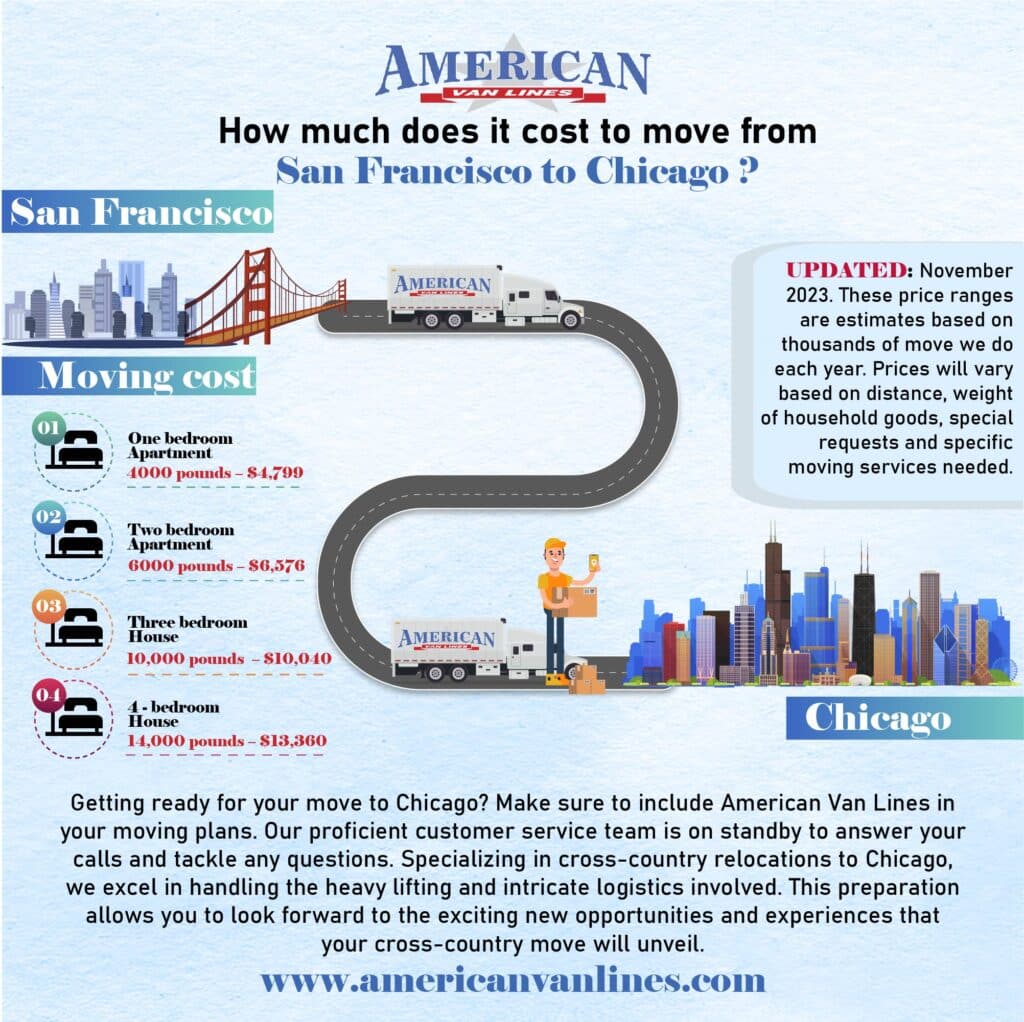Moving From San Francisco To Chicago
Are you Considering a Cross-Country Move from San Francisco to Chicago? For those fed up with the exorbitant costs and fast-paced lifestyle of the West Coast, the Windy City may be an attractive alternative. With its rich cultural heritage, vibrant neighborhoods, and a more affordable cost of living, Chicago is luring many San Franciscans to make the move. But what can you expect from this significant change of scenery? From navigating the Midwest climate to finding a new job, we'll explore the essential things to know when moving from San Francisco to Chicago.

- Why You Should Consider Moving from San Francisco to Chicago
- How much does it cost to move from San Francisco to Chicago?
- Is it a good idea to move to Chicago?
- Is it cheaper to live in Chicago or San Francisco?
- Why are people moving away from San Francisco?
- FAQ
- What are the main differences in cost of living between San Francisco and Chicago?
- How do the job markets in San Francisco and Chicago compare?
- What are the differences in culture and lifestyle between San Francisco and Chicago?
- What are some tips for making the transition from San Francisco to Chicago as smooth as possible?
Why You Should Consider Moving from San Francisco to Chicago
Moving from San Francisco to Chicago can be a fantastic decision for those looking to escape the high cost of living in the Bay Area and enjoy a more affordable lifestyle in the Midwest. Chicago offers a unique blend of urban excitement, cultural attractions, and Midwestern charm that can make it an attractive option for those looking to start anew.
Cost of Living Comparison
One of the most significant advantages of moving from San Francisco to Chicago is the cost of living. San Francisco is notorious for being one of the most expensive cities in the United States, with the median home price hovering around $1 million. In contrast, Chicago's median home price is around $270,000, making it a much more affordable option for those looking to purchase a home.
| City | Median Home Price | Average Rent |
|---|---|---|
| San Francisco | $1,000,000 | $4,500/month |
| Chicago | $270,000 | $1,800/month |
Job Market Comparison
While San Francisco is known for its thriving tech industry, Chicago has a diverse economy with strong industries in healthcare, finance, and manufacturing. The job market in Chicago is also less competitive than in San Francisco, making it easier to find employment.
Weather Comparison
San Francisco is famous for its foggy and cool weather, while Chicago is known for its cold winters and hot summers. However, Chicago's weather is also more seasonal, with distinct spring, summer, fall, and winter seasons, which can be a welcome change for those who enjoy experiencing the full range of seasons.
Cultural Attractions
Both San Francisco and Chicago are culturally rich cities with plenty of attractions to offer. Chicago is home to world-class museums such as the Art Institute of Chicago and the Field Museum, as well as iconic landmarks like Willis Tower and Navy Pier. The city also has a thriving music and theater scene, with numerous venues and festivals throughout the year.
Food Scene Comparison
San Francisco is famous for its diverse culinary scene, with a wide range of restaurants serving cuisine from around the world. Chicago, on the other hand, is known for its classic Midwestern comfort food, including deep-dish pizza, hot dogs, and Italian beef sandwiches. However, Chicago's food scene is also rapidly evolving, with new restaurants and chefs constantly emerging.
How much does it cost to move from San Francisco to Chicago?

The cost of moving from San Francisco to Chicago can vary greatly depending on several factors, including the size of your household, the distance, and the type of moving services you require. On average, a long-distance move from San Francisco to Chicago can cost anywhere from $2,000 to $5,000 or more.
Factors Affecting Moving Costs
Several factors can influence the overall cost of your move, including:
- Weight and volume of your belongings: The more items you have, the heavier and bulkier your shipment will be, increasing the cost.
- Distance and fuel costs: The longer the distance, the more fuel is consumed, leading to higher costs.
- Type of moving services: Hiring professional movers, renting a moving container, or DIY moving can impact the overall cost.
Estimated Moving Costs Based on Household Size
Here are some estimated moving costs based on household size:
- Studio/1-bedroom apartment: $2,000 - $3,000
- 2-bedroom apartment: $2,500 - $4,000
- 3-bedroom apartment: $3,500 - $5,500
- 4-bedroom apartment: $4,500 - $7,000
- 5-bedroom apartment: $5,500 - $9,000
Tips to Reduce Moving Costs
To save money on your move, consider the following tips:
- Packing yourself: Instead of hiring professional packers, do it yourself to save on labor costs.
- Downsizing: Reduce the weight and volume of your belongings by selling, donating, or discarding unwanted items.
- Getting quotes from multiple movers: Compare prices and services to find the best deal for your budget.
Is it a good idea to move to Chicago?

Moving to Chicago can be a great idea for many people, depending on their individual circumstances, preferences, and priorities. Chicago is a world-class city with a lot to offer, from its vibrant cultural scene to its diverse economy and stunning architecture. Here are some points to consider:
Pros of Moving to Chicago
Chicago has many advantages that make it an attractive place to live. Here are some of the key benefits:
- Diverse Economy: Chicago is a major hub for industries such as finance, healthcare, technology, and logistics, offering a wide range of job opportunities.
- Cultural Attractions: The city is home to world-renowned museums, theaters, and music venues, providing endless entertainment options.
- High-Quality Education: Chicago is home to several top-ranked universities, including the University of Chicago and Northwestern University.
Cons of Moving to Chicago
While Chicago has many advantages, it's not without its drawbacks. Here are some potential downsides to consider:
- High Cost of Living: Chicago has a relatively high cost of living, with steep prices for housing, transportation, and food.
- Cold Weather: Chicago is known for its harsh winters, with cold temperatures and heavy snowfall.
- Congested Traffic: The city's busy streets and highways can make commuting a challenge.
Things to Consider Before Making the Move
Before deciding to move to Chicago, here are some key factors to think about:
- Neighborhood Choice: Chicago has many unique neighborhoods to choose from, each with its own character and advantages.
- Job Opportunities: Research the job market in your industry and consider the availability of job openings.
- Lifestyle Preferences: Think about your personal preferences, such as proximity to public transportation, parks, and cultural attractions.
Is it cheaper to live in Chicago or San Francisco?

The cost of living in Chicago versus San Francisco is a significant factor to consider when deciding which city to call home. Both cities are major metropolitan areas with a high quality of life, but they have distinct differences in terms of housing, transportation, food, and other living expenses.
Housing Costs
One of the most significant factors in determining the cost of living is housing. The cost of renting or buying a home in San Francisco is significantly higher than in Chicago. According to data from Zillow, the median home value in San Francisco is around $1.4 million, while in Chicago, it's around $270,000. When it comes to renting, the average rent for a one-bedroom apartment in San Francisco is around $3,000 per month, compared to around $1,800 per month in Chicago.
Transportation Costs
Transportation costs can also vary significantly between the two cities. San Francisco has a comprehensive public transportation system, including buses, trains, and ferries, but it comes at a cost. A monthly public transportation pass in San Francisco can cost around $100, while in Chicago, it's around $70. Additionally, parking in San Francisco can be expensive, with metered parking rates ranging from $3 to $6 per hour. In contrast, parking in Chicago is generally more affordable, with metered parking rates ranging from $2 to $4 per hour.
Food and Other Living Expenses
When it comes to food and other living expenses, San Francisco tends to be more expensive than Chicago. A meal at a mid-range restaurant in San Francisco can cost around $20 per person, while in Chicago, it's around $15 per person. Additionally, San Francisco has a higher sales tax rate, at 9.25%, compared to Chicago's 8.25%. However, both cities have a wide range of amenities and services, including grocery stores, gyms, and entertainment options, which can affect the overall cost of living.
Here are some key takeaways to consider:
- Housing costs are significantly higher in San Francisco than in Chicago.
- Transportation costs are higher in San Francisco, especially when it comes to public transportation and parking.
- Food and other living expenses are generally higher in San Francisco, but both cities have a wide range of amenities and services.
Why are people moving away from San Francisco?

The city of San Francisco, known for its iconic Golden Gate Bridge, steep hills, and vibrant cultural scene, has been experiencing a phenomenon of people moving away from the city. This trend has been observed in recent years, and various factors contribute to this exodus.
High Cost of Living
One of the primary reasons people are moving away from San Francisco is the exorbitant cost of living. The city has some of the highest housing prices in the country, with the median home price exceeding $1 million. This makes it difficult for people to afford housing, even with a decent income. Additionally, the cost of food, transportation, and other living expenses is significantly higher in San Francisco compared to other cities in the United States.
- The average rent for a one-bedroom apartment in San Francisco is over $3,000 per month.
- The cost of groceries is 44% higher in San Francisco compared to the national average.
- The city has some of the highest taxes in the country, with a sales tax rate of 9.25%.
Lack of Affordable Housing
Another significant factor contributing to people moving away from San Francisco is the lack of affordable housing. The city's housing market is characterized by a severe shortage of affordable housing options, leading to a competitive and intimidating environment for those seeking affordable housing. This shortage is exacerbated by the city's strict zoning laws, which limit the development of new housing units.
- In 2020, San Francisco had a shortage of over 60,000 affordable housing units.
- The city's affordable housing waiting list has over 20,000 people.
- The average wait time for affordable housing in San Francisco is over 10 years.
Traffic and Congestion
San Francisco is notorious for its traffic and congestion, which can be frustrating and time-consuming for commuters. The city's narrow streets, limited parking options, and high population density contribute to this problem. Furthermore, the tech industry's rapid growth has led to an influx of commuters, making traffic even worse.
- The average San Francisco commuter spends over 79 hours per year stuck in traffic.
- The city has some of the worst traffic in the world, ranking 4th in the 2020 Traffic Index.
- The Bay Bridge, which connects San Francisco to the East Bay, is one of the most congested roadways in the country.
FAQ
What are the main differences in cost of living between San Francisco and Chicago?
When moving from San Francisco to Chicago, one of the most significant factors to consider is the cost of living. San Francisco is notorious for being one of the most expensive cities in the US, with a high median home price and steep rental rates. In contrast, Chicago offers a relatively more affordable lifestyle. The median home price in Chicago is significantly lower than in San Francisco, and the rental rates are also more reasonable. Additionally, Chicago has lower sales taxes and income taxes compared to San Francisco. However, it's essential to note that Chicago has a higher property tax rate, which can impact homeowners. Overall, Chicago offers a more affordable lifestyle, making it an attractive option for those looking to escape the high costs of San Francisco.
How do the job markets in San Francisco and Chicago compare?
The job market is a crucial consideration when moving from San Francisco to Chicago. San Francisco is a hub for the tech industry, with many major companies and startups based there. While Chicago also has a thriving tech sector, it is not as dominant as in San Francisco. However, Chicago has a diverse economy, with strong industries in healthcare, finance, and manufacturing. Chicago is also home to many Fortune 500 companies, including Boeing, United Airlines, and Walgreens. While the unemployment rate in Chicago is slightly higher than in San Francisco, the city's job market is still strong, and many professionals have success finding employment in their field.
What are the differences in culture and lifestyle between San Francisco and Chicago?
When moving from San Francisco to Chicago, you can expect some significant differences in culture and lifestyle. San Francisco is known for its progressive politics, diverse communities, and counter-culture vibe. In contrast, Chicago is often seen as more traditional and Midwestern, with a stronger sense of community and neighborhood identity. Chicago also has a more seasonal climate, with cold winters and warm summers, whereas San Francisco's climate is generally mild year-round. Additionally, Chicago is a more spread-out city, with a greater emphasis on cars and suburbs, while San Francisco is a more walkable city with a strong public transportation system. While both cities have a rich arts and cultural scene, Chicago's is often more low-key and community-focused, whereas San Francisco's is more avant-garde and experimental.
What are some tips for making the transition from San Francisco to Chicago as smooth as possible?
When moving from San Francisco to Chicago, it's essential to be prepared for the transition. One tip is to research, research, research – learn as much as you can about Chicago's neighborhoods, cost of living, and job market before making the move. Another tip is to network – connect with people in your industry or profession who are already living in Chicago to get a sense of the job market and business culture. Additionally, be prepared for the weather – invest in warm clothing and a good coat to survive Chicago's cold winters. Finally, be open-minded and flexible – Chicago is a city that is full of surprises, and being able to adapt to new situations and experiences is key to making a successful transition.
